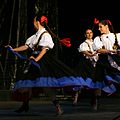National costumes of Poland (Polish: stroje ludowe) vary by region. They are not worn in daily life but at folk festivals, folk weddings, religious holidays, harvest festivals and other special occasions.The costumes may reflect region and sometimes social or marital status.[1]
Poland's inhabitants live in the following historic regions of the country: Greater Poland, Lesser Poland, Mazovia, Pomerania, Warmia, Masuria, Podlasie, Kujawy and Silesia.
Lesser Poland / Małopolska
- Kraków region: The woman's costume includes a white blouse, a vest that is embroidered and beaded on front and back, a floral full skirt, an apron, a red coral bead necklace, and lace-up boots. Unmarried women and girls may wear a flower wreath with ribbons while married women wear a white kerchief on their head. The men wear a blue waistcoat with embroidery and tassels, striped trousers, a krakuska cap ornamented with ribbons and peacock feathers and metal rings attached to the belt.
- Lachy Sądeckie live in southern Lesser Poland, especially in Nowy Sącz County and Kotlina Sądecka.
Gorals / Górale
Gorals live in southern Poland along the Carpathian Mountains, in Podhale of the Tatra Mountains and parts of the Beskids. Their costumes vary depending on the region.
Subcarpathian region / Podkarpacie
- Rzeszów[
- Uplanders
- Lasowiacy
Lublin region
- Lublin region is represented by the Krzczonów folk costume
- Biłgoraj
Silesia / Śląsk
- Bytom / Piekary Śląskie in Upper Silesia
- Cieszyn Silesia, seeMain article: Cieszyn folk costume
- Lower Silesia
Pomerania / Pomorze, Kujawy, Warmia
- Kashubians inhabit Kashubia in north-central Poland.
- Kujawy
- Pyrzyce
- Warmia
Masovia and central Poland
Places in Masovia with distinctive costumes include:
- Łowicz
- Kurpie of the Green and White Primeval Forests
- Wilanow
- Opoczno
- Sieradz
Podlaskie / Podlasie
- Podlasie
Greater Poland / Wielkopolska
- Bambrzy
- Szamotuly.
- Biskupianski
Upper class
The szlachta were Polish nobles and had their own attire which included the kontusz, pas kontuszowy (sash) and a crimson żupan.
- source: wikipedia




















































